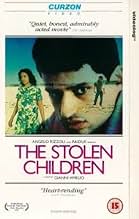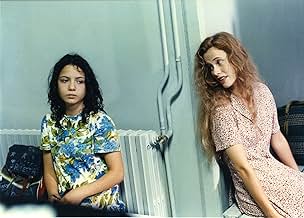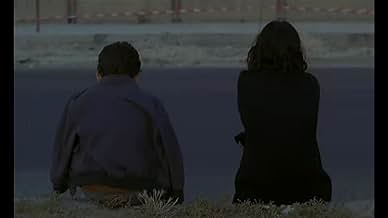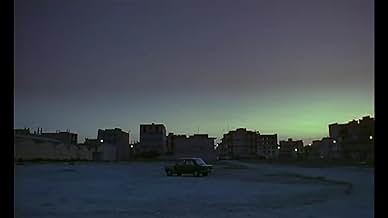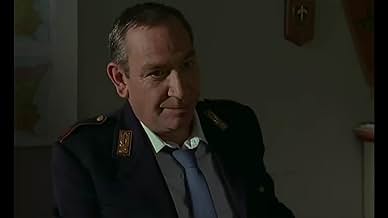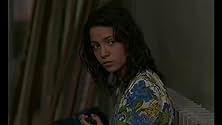Cop Antonio is ordered to take 11-year-old Rosetta and her brother Luciano from Milan to an orphanage in Sicily. Their mother has been jailed for forcing Rosetta into prostitution. Reluctant... Read allCop Antonio is ordered to take 11-year-old Rosetta and her brother Luciano from Milan to an orphanage in Sicily. Their mother has been jailed for forcing Rosetta into prostitution. Reluctant Antonio soon learns to sympathize with the kids.Cop Antonio is ordered to take 11-year-old Rosetta and her brother Luciano from Milan to an orphanage in Sicily. Their mother has been jailed for forcing Rosetta into prostitution. Reluctant Antonio soon learns to sympathize with the kids.
- Awards
- 18 wins & 14 nominations total
Featured reviews
The child actors are supreme and the plot development feels real from beginning to end.
There are very few films that can make us confront a difficult issue without resorting to maudlin tears or some other form of emotional manipulation. This is one of them -- no Hollywood treatment here.
And I like the fact that the trip is a journey -- both physically and spiritually. It starts in the north of Italy and leads us progressively towards its southern extremity in Sicily. As the children migrate to the South, our hopes and hearts warm as we come to expect a new emotional climate for them. As with any film intending to make a serious comment on the devestating nature of child abuse, something intervenes to prove to us that our hopes are premature.... This film betrays no compromise in its portrayal of innocence lost and regained and lost once again. The scene at the end with the girl comforting her brother is one of the most poignant I know in film.
I would put this film at the top of a narrow list of films addressing childhood trauma (including "Salaam Bombay!" and "Alice in the Cities"). But the perfection of the child actors, the tremendous care of the storytelling (director Gianni Amelio co-authored the screenplay), and the generous, ambulant scenery make this film a standout that has seldom been rivaled.
There are very few films that can make us confront a difficult issue without resorting to maudlin tears or some other form of emotional manipulation. This is one of them -- no Hollywood treatment here.
And I like the fact that the trip is a journey -- both physically and spiritually. It starts in the north of Italy and leads us progressively towards its southern extremity in Sicily. As the children migrate to the South, our hopes and hearts warm as we come to expect a new emotional climate for them. As with any film intending to make a serious comment on the devestating nature of child abuse, something intervenes to prove to us that our hopes are premature.... This film betrays no compromise in its portrayal of innocence lost and regained and lost once again. The scene at the end with the girl comforting her brother is one of the most poignant I know in film.
I would put this film at the top of a narrow list of films addressing childhood trauma (including "Salaam Bombay!" and "Alice in the Cities"). But the perfection of the child actors, the tremendous care of the storytelling (director Gianni Amelio co-authored the screenplay), and the generous, ambulant scenery make this film a standout that has seldom been rivaled.
10Jeaneth2
I saw this movie almost ten years ago, and once or twice since then on TV, and I have never forgotten it. It is both heartbreaking and uplifting, sensitively directed and beautifully performed. The relationship between the young carabiniere and the two children he's escorting evolves so quietly and naturally that it never seems forced, as relationships so often seem in movies. I hesitate to cite specific scenes for fear of spoilage, but there is one moment in particular, when Antonio and young Luciano are swimming in the ocean, that perfectly illustrates the growing trust between them. The scene is quite simply breathtaking.
I wish this movie were available on DVD, because it deserves to be seen by more people. I would add it to my collection in a heartbeat if I could. Instead, I can only hope that some local theater or art museum will screen it someday as part of a film festival.
A truly unforgettable movie.
I wish this movie were available on DVD, because it deserves to be seen by more people. I would add it to my collection in a heartbeat if I could. Instead, I can only hope that some local theater or art museum will screen it someday as part of a film festival.
A truly unforgettable movie.
This is one of the best films of all time. The story is heartbreaking: an 11 year-old girl has been forced into prostitution by her mother. When the police arrest the mother, Rosetta and her little brother Luciano (who is 9) must be taken to a children's home in the south of Italy. A young Carabiniere named Antonio is assigned the task of taking them from Milan to Sicilly, even though he's barely more than a child himself. The journey takes this mismatched threesome to Antonio's home province, where he re-unites briefly with his sister and his old granny, before Rosetta is recognized from a magazine cover, and shunned. The growing tenderness among the three young people is the essence of the story. The girl, although only 11, conveys the bitterness of adulthood through her ineffably sad eyes. She knows so much more about life than her 19 year-old policeman, yet without any seedy sexual implications, he comes to teach her through his tender care that there's more to life than sorrow. Luciano is a beautiful child, whose adoration of the soldier/cop is delicately and warmly depicted. Only The 400 Blows and Forbidden Games have captured the ache of childhood as well. The director has used stunning compositions and lingering takes of the Italian countryside that make the story resonate beyond its intimate canvas. The acting is brilliant. I suppose the only reason this film has not been released on DVD is it's controversial subject matter, which is a shame, because that shunning is what the film is about. The Italian title is Il Ladro di Bambini. Don't miss it!
The story of a young carabiniere that has been assigned the job to escort a couple of minors from Milan to their native Sicily. Stops along the way include the riviera (around Genova or Livorno), Rome, Calabria. Travel is done by train and by car. We see segments of italy in their socio-economic regional realities. The folks in Calabria are seen living next to a busy road in a house with no stucco covering the bare bricks, a common tactic used in the south to qualify for a taxation exemption (being the house not completed). Smartly filmed, it candidly reveals an Italy closer to what natives struggling to make a living would experience in having to travel along the length of the Italian booth. This is a fictional movie, but there is an effort to make evident how realistically people live today.
This film is one that will be difficult to view. The basis of the film is that two children are taken away from their abusive mother. Lo Verso must escort them to an orphanage however the orphanage does not want the children. I won't spoil anything for you, but I will say that this type of film would never be made in the US. The themes that are suggested are extremely controversial.
I too agree with many people when they say that this is one of the best acting performances by children ever.
I too agree with many people when they say that this is one of the best acting performances by children ever.
Did you know
- TriviaEnrico Lo Verso was the only member of the main cast to be a professional actor.
- ConnectionsEdited into Lo schermo a tre punte (1995)
- SoundtracksDomenica bestiale
Written and performed by Fabio Concato
Courtesy of Warner Chappell - PolyGram Italia
- How long is The Stolen Children?Powered by Alexa
Details
Box office
- Gross US & Canada
- $931,280
- Opening weekend US & Canada
- $17,524
- Mar 7, 1993
- Gross worldwide
- $931,280
- Runtime1 hour 54 minutes
- Color
- Aspect ratio
- 1.85 : 1
Contribute to this page
Suggest an edit or add missing content

